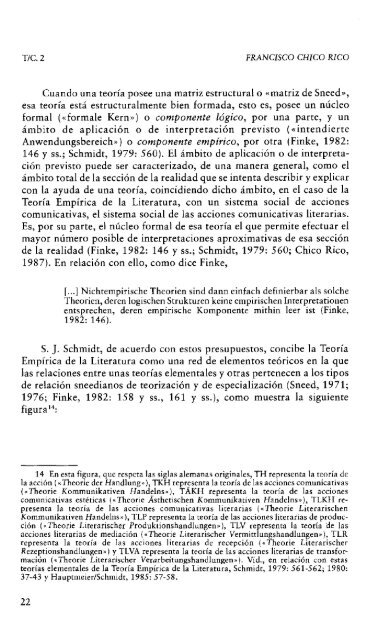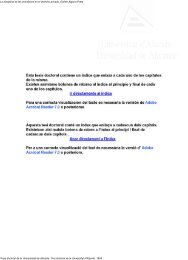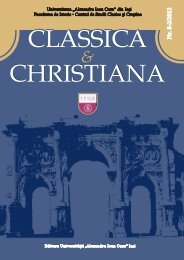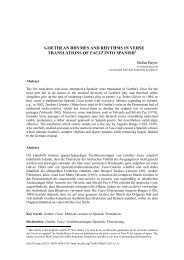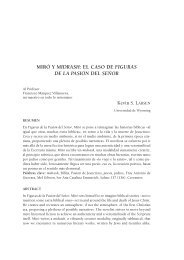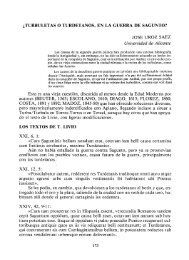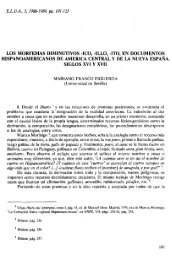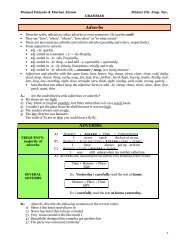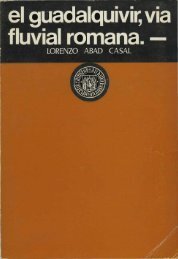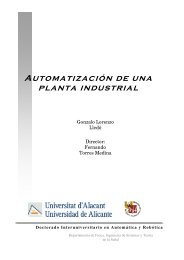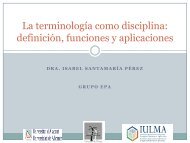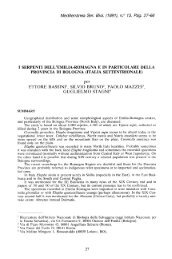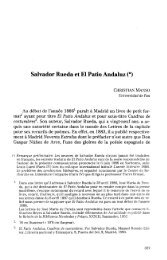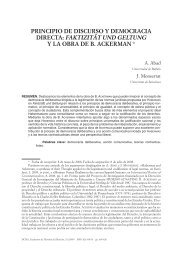la ciencia empÃrica de la literatura. conceptos, métodos ... - RUA
la ciencia empÃrica de la literatura. conceptos, métodos ... - RUA
la ciencia empÃrica de la literatura. conceptos, métodos ... - RUA
You also want an ePaper? Increase the reach of your titles
YUMPU automatically turns print PDFs into web optimized ePapers that Google loves.
TIC. 2<br />
FRANCISCO CHICO RICO<br />
Cuando una teoría posee una matriz estructural o «matriz <strong>de</strong> Sneed>>,<br />
esa teoría está estructuralmente bien formada, esto es, posee un núcleo<br />
formal ( «formale Kern») o componente lógico, por una parte, y un<br />
ámbito <strong>de</strong> aplicación o <strong>de</strong> interpretación previsto ( «intendierte<br />
Anwendungsbereich») o componente empírico, por otra (Finke, 1982:<br />
146 y ss.; Schmidt, 1979: 560). El ámbito <strong>de</strong> aplicación o <strong>de</strong> interpretación<br />
previsto pue<strong>de</strong> ser caracterizado, <strong>de</strong> una manera general, como el<br />
ámbito total <strong>de</strong> <strong>la</strong> sección <strong>de</strong> <strong>la</strong> realidad que se intenta <strong>de</strong>scribir y explicar<br />
con <strong>la</strong> ayuda <strong>de</strong> una teoría, coincidiendo dicho ámbito, en el caso <strong>de</strong> <strong>la</strong><br />
Teoría Empírica <strong>de</strong> <strong>la</strong> Literatura, con un sistema social <strong>de</strong> acciones<br />
comunicativas, el sistema social <strong>de</strong> <strong>la</strong>s acciones comunicativas literarias.<br />
Es, por su parte, el núcleo formal <strong>de</strong> esa teoría el que permite efectuar el<br />
mayor número posible <strong>de</strong> interpretaciones aproximativas <strong>de</strong> esa sección<br />
<strong>de</strong> <strong>la</strong> realidad (Finke, 1982: 146 y ss.; Schmidt, 1979: 5 60; Chico Rico,<br />
1987). En re<strong>la</strong>ción con ello, como dice Finke,<br />
f ... ] Nichtempirische Theorien sind dann einfach <strong>de</strong>finierbar als solche<br />
Theorien, <strong>de</strong>ren logischen Strukturen keine empirischen Imerpretationen<br />
entsprechen, <strong>de</strong>ren empirische Komponente mithin leer ist (Finke,<br />
1982: 146).<br />
S. J. Schmidt, <strong>de</strong> acuerdo con estos presupuestos, concibe <strong>la</strong> Teoría<br />
Empírica <strong>de</strong> <strong>la</strong> Literatura como una red <strong>de</strong> elementos teóricos en <strong>la</strong> que<br />
<strong>la</strong>s re<strong>la</strong>ciones entre unas teorías elementales y otras pertenecen a los tipos<br />
<strong>de</strong> re<strong>la</strong>ción sneedianos <strong>de</strong> teorización y <strong>de</strong> especialización (Sneed, 1971;<br />
1976; Finke, 1982: 158 y ss., 161 y ss.), como muestra <strong>la</strong> siguiente<br />
figura 14 :<br />
14 En esta figura, que respeta <strong>la</strong>s sig<strong>la</strong>s alemanas originales, TH representa <strong>la</strong> teoría <strong>de</strong><br />
<strong>la</strong> acción ( « Theorie <strong>de</strong>r Handlung» ), TKH representa <strong>la</strong> teoría <strong>de</strong> <strong>la</strong>s acciones comunicativas<br />
( ), TLKII representa<br />
<strong>la</strong> teoría <strong>de</strong> <strong>la</strong>s acciones comunicativas literarias ( « Theorie Literarischen<br />
Kommuníkativen Han<strong>de</strong>lns » ), TLP representa <strong>la</strong> teoría <strong>de</strong> <strong>la</strong>s acciones literarias <strong>de</strong> producción<br />
( "Theorie Lirerarischer Prod uktionshandlungen>> ), TLV representa <strong>la</strong> teoría <strong>de</strong> <strong>la</strong>s<br />
acciones literarias <strong>de</strong> mediación ( « Theorie Literarischer Vermittlungshandlungen» ), TLR<br />
representa <strong>la</strong> teoría <strong>de</strong> <strong>la</strong>s acciones literarias <strong>de</strong> recepción 1 «Theorie Literarischer<br />
Rezeptionshandlungen») y TLVA representa <strong>la</strong> teoría <strong>de</strong> <strong>la</strong>s acciones literarias <strong>de</strong> transformación<br />
( « Theorie Literarischer Verarbeitungshandlungen,). Vid., en re<strong>la</strong>ción con estas<br />
teorías elementales <strong>de</strong> <strong>la</strong> Teoría Empírica <strong>de</strong> <strong>la</strong> Literatura, Schmidt, 1979: 561-562; 1980:<br />
37-43 y HauptmeieriSchmidt, 1985: 57-58.<br />
22


